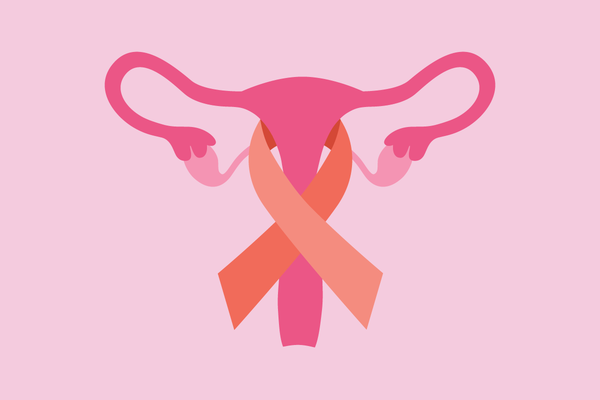Knowledge is power when it comes to endometrial cancer, which is a cancer that occurs in the lining of the uterus. Learning the signs and symptoms can help you to act as quickly as possible to catch endometrial cancer early, when it may be more treatable. So, we reached out to Shawana Moore, DNP, CRNP, WHNP-BC, nurse practitioner and assistant professor at Thomas Jefferson University, to help us better understand this condition.
What is the difference between endometrial cancer and uterine cancer?
Endometrial cancer is one of two types of uterine cancer, and it’s the more common type. The other type is uterine sarcoma. The difference between endometrial cancer and uterine sarcoma is where the cancer cells are located. Endometrial cancer is located on the lining of the uterus, but uterine sarcoma is in the uterine muscles.
What are the potential symptoms of endometrial cancer?
An early sign that someone may have endometrial cancer is abnormal vaginal bleeding. Additionally, some people might have pelvic pain or unexplained weight loss. Typically, the bleeding is the first sign of cancer, and other symptoms might show up later if you don’t get treatment early on. These are not all of the symptoms of endometrial cancer and they could be caused by other conditions. These symptoms could be easily overlooked, so it is important to talk to your doctor about any symptoms of concern as soon as they arise.
What are the risk factors for endometrial cancer?
Some women are more at risk than others for developing endometrial cancer. Increased risk comes with obesity, age (being older than 50), unhealthy diet and lack of exercise, and Type 2 diabetes (a disease that prevents your body from using insulin properly). Additionally, women with Lynch syndrome (a genetic condition associated with a high risk of colon cancer) or a history of breast cancer or ovarian cancer, or a history of endometrial hyperplasia (overgrowth of the endometrial lining), have heightened risk. Taking certain medications that affect your hormone levels also can increase risk. These are not all possible risk factors for endometrial cancer, but if you know you have an increased risk, it’s important to report any unusual bleeding quickly to your healthcare provider (HCP) for further testing.
How is endometrial cancer diagnosed, and can it be detected early?
Your HCP has many tools to figure out if you do, indeed, have endometrial cancer and how advanced it is. They will use your medical history, a pelvic exam, endometrial biopsy (taking a tissue sample of the uterine lining), dilation and curettage, also known as a D&C (a procedure to remove the uterine lining), ultrasound, and/or hysteroscopy (an examination of the uterus and cervix). If they detect cancer, you will undergo additional testing to see if the cancer has spread, including chest X-rays, MRIs, CT scans and other procedures.
Currently, there aren’t any endometrial cancer screening tests for people with average risk and no symptoms. Women with a history of certain types of hereditary colon cancer (cancer that starts in the colon or rectum) might be offered an annual biopsy, in which the HCP takes a sample of cells from your uterus to check for cancer, starting at age 35.
How can endometrial cancer affect sex, fertility and pregnancy?
There are certain times in life when your uterus might be more important to you than others, such as when you’re trying to become pregnant or are pregnant. Endometrial cancer is not commonly diagnosed in women of childbearing age. When it is, fertility and pregnancy may be affected. The disease can also cause sexual intercourse to be painful or uncomfortable as a result of the discomfort that might come with testing, treatments or due to the disease itself. Having your uterus surgically removed as a treatment would result in losing your ability to become pregnant.
Is there a connection between endometriosis and endometrial cancer?
If you have endometriosis, you might wonder if you have a higher risk of developing endometrial cancer. Endometriosis is unlikely to increase your risk of endometrial cancer.
What are the treatment options for endometrial cancer?
Treatment will vary, based on how advanced the cancer is. Surgery is considered the main treatment for this type of cancer. However, other treatments may be used along with surgery to ensure the cancer is gone. Additional treatments include radiation and chemotherapy, hormone therapy, targeted therapy and immunotherapy.
What is the role of family history in endometrial cancer?
A family history of endometrial or colorectal cancer may increase your risk for the development of endometrial cancer. Studies have shown that this is especially true if a close family member — like a mother, aunt, grandmother or sister — has had the disease. Reach out to your relatives to determine their health history to better assess your risk with your HCP.
What racial disparities exist among women with endometrial cancer?
Like some other diseases, some groups have a higher risk than others. Black women are twice as likely to die from endometrial cancer than any other women. Some possible reasons for this include a later diagnosis with more advanced stages of the disease, having surgery less frequently, misunderstandings about vaginal bleeding and having additional risk factors.
Is endometrial cancer likely to come back again, and is there treatment if it does?
Healing from endometrial cancer can seem difficult enough without the threat of the cancer coming back, but approximately 13% of all endometrial cancers do come back, according to a 2015 systematic search of MEDLINE, EMBASE and the Cochrane Library databases. Treatment is available if the cancer does come back.
The most important steps you can take are to report any symptoms to your HCP, and ask if you need any testing if you have a genetic history of endometrial cancer in your family or any of the risk factors.
References
https://www.ajog.org/article/S0002-9378(16)46212-5/fulltext
https://www.cancer.gov/about-cancer/treatment/types/immunotherapy#
https://www.cancer.gov/about-cancer/treatment/types/radiation-therapy
https://www.cancer.gov/about-cancer/treatment/types/targeted-therapies
https://www.cancer.org/cancer/endometrial-cancer/about.html
https://www.cancer.org/cancer/endometrial-cancer/causes-risks-prevention/risk-factors.html
https://www.cancer.org/cancer/endometrial-cancer/detection-diagnosis-staging/signs-and-symptoms.html
https://www.cancer.org/cancer/endometrial-cancer/treating.html
https://my.clevelandclinic.org/health/diseases/16569-atypical-endometrial-hyperplasia
https://jamanetwork.com/journals/jamanetworkopen/fullarticle/2766042
https://www.mayoclinic.org/diseases-conditions/endometriosis/symptoms-causes/syc-20354656
https://www.mayoclinic.org/diseases-conditions/ovarian-cancer/symptoms-causes/syc-2037594
https://www.mayoclinic.org/tests-procedures/chemotherapy/about/pac-20385033#
https://www.mdanderson.org/publications/focused-on-health/endometriosis-cancer-risk.h32Z1591413.html
https://pubmed.ncbi.nlm.nih.gov/19078930
https://www.sciencedirect.com/science/article/abs/pii/S0090825806001739
This resource was created with funding and support from Eisai Inc.
- Black Women More Likely to Die from Endometrial Cancer - HealthyWomen ›
- Doctors Overlooked My Endometrial Cancer Symptoms for More Than a Year - HealthyWomen ›
- Postmenopausal Women and Endometrial Cancer - HealthyWomen ›
- How Endometrial Cancer Is Diagnosed - HealthyWomen ›
- My Endometrial Cancer Was Dismissed as Fibroids - HealthyWomen ›
- Ask the Expert: Endometrial Cancer - HealthyWomen ›
- Metabolic Syndrome and Endometrial Cancer: What’s the Connection? - HealthyWomen ›
- Is It Endometriosis or Endometrial Cancer? - HealthyWomen ›
- Questions and Answers About Endometrial Cancer - HealthyWomen ›
- Preguntas y respuestas relacionadas con el cáncer endometrial - HealthyWomen ›
- Endometrial Cancer Diagnosis and Endometrial Cancer Test - HealthyWomen ›
- Diagnóstico y pruebas del cáncer endometrial - HealthyWomen ›
- Lifestyle and Dietary Changes for Endometriosis - HealthyWomen ›
- Why Are Endometrial Cancer Rates Rising? - HealthyWomen ›
- Q&A About Endometrial Cancer Treatment Options - HealthyWomen ›
- Mujeres posmenopáusicas y el cáncer endometrial - HealthyWomen ›
- Preguntas y respuestas relacionadas con las opciones terapéuticas del cáncer endometrial - HealthyWomen ›
- Even a Hysterectomy May Not Protect Against Ovarian Cancer - HealthyWomen ›
- Living with Endometrial Cancer - HealthyWomen ›





